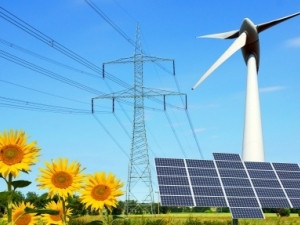
Power utility Eskom has secured a $180 million (R2.6 billion) loan from the National Development Bank (NDB) - formerly BRICS Development Bank - to invest in renewable energy in SA.
Yesterday, the NDB announced its board of directors had approved its first set of loans involving financial assistance of $811 million, to be disbursed in tranches, supporting 2 370MW of renewable energy capacity.
According to the NDB, Eskom will get the funds over 12 to 20 years for transmission lines to evacuate 670MW generation and transformation of 500MW of renewable energy generation by independent power producers in the country. It believes the investment will result in a CO2 avoidance of two million tonnes.
Although still heavily dependent on fossil fuels, SA has been championing the use of renewable energy sources. Solar, biomass and wind energy systems are being rolled out in the country at a steady pace and feeding clean energy into the strained electrical grid.
More needed
However, the power utility says the loan is a drop in the ocean of what it needs in the next 20 years.
"We, as Eskom, have said that between now and 2025, we are going to spend R213 billion on transmission lines across the country; R30 billion of this will be just for transmission lines from renewable energy plants," says Eskom spokesperson Khulu Phasiwe.
He points out the funds from the loan will mostly be used to connect households in areas where there is no electricity.
Part of the loan will be used to ensure 44 companies are connected to the grid as part of the Renewable Energy Independent Power Producer Programme.
Phasiwe says the large sum Eskom wants to borrow is to enable the parastatal's future growth. "We are planning ahead for when the economy is booming again."
"The more renewables you increase in your energy mix, the less coal you need to use. Currently, 86% of South Africa's energy comes from coal," Phasiwe adds.
Johan van den Berg, CEO of South African Wind Energy Association, says this will hopefully aid the industry in the sense that the money Eskom is borrowing will boost development of the grid network, making it easier to connect new developments.
Tonne targets
The other recipients of the loan are Banco Nacional de Desenvolvimento Economico e Social from Brazil, which secured $300 million for on-lending to projects for generation of 600MW additional renewable energy capacity in the country. The target is CO2 avoidance of one million tonnes.
Shanghai Lingang Hongbo New Energy Development in China got assistance of local currency equivalent of $81 million for generation of 100MW of rooftop solar power, subject to completion of domestic approval process. The target is CO2 avoidance of 73 000 tonnes.
Canara Bank in India received $250 million, with a first tranche of $75 million, for on-lending to projects for generation of 500MW additional renewable energy capacity in the country. CO2 avoidance of 815 000 tonnes is targeted.
KV Kamath, president of the NDB, says: "This is an important milestone for the bank and we are delighted to have met the goals and the time schedules envisioned by the leaders of the BRICS countries.
"With this, we embark on a journey to provide speedy assistance to projects across developing nations. We are pleased the projects deal with green and renewable energy and hope they will act as catalysts for development in our member states."
In accordance with its core focus, this first set of projects being financed by the NDB is in the area of green and renewable energy. It is estimated the projects will collectively provide additional generation capacity of 2 370MW of clean energy, leading to reduction in greenhouse gas emissions by nearly four million tonnes per year.
Each loan modality is different based on project-specific features and borrower preferences. Government approvals, where necessary, will be sought as part of follow-up procedures.
The NDB is instituted with a vision to support and foster infrastructure and sustainable development initiatives in emerging economies. The founding members of the NDB - Brazil, Russia, India, China and South Africa (BRICS) - have brought in capital of $1 billion as an initial contribution.
Late last year, the South African government said it plans to use R2 billion from the sale of its shares in Vodacom as the initial capital contribution to the NDB.
Share